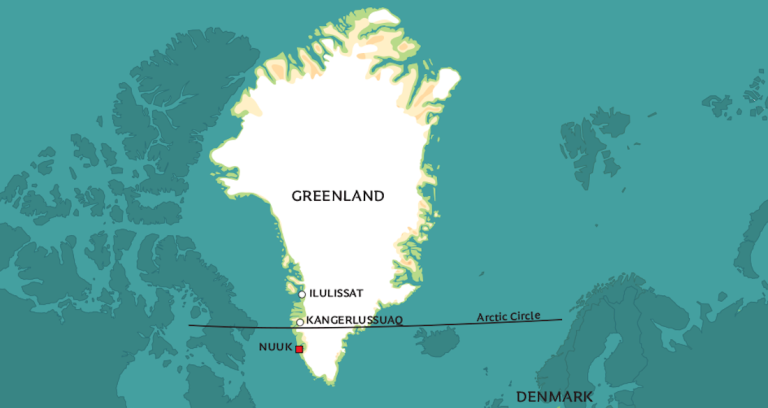
Vance used the visit to accuse Denmark of neglecting Greenland’s security and infrastructure, framing U.S. stewardship as a benevolent alternative
Washington, D.C. — The Trump administration’s renewed campaign to acquire Greenland has sparked global debate over the feasibility—and ethics—of territorial expansion in the 21st century.
President Donald Trump has repeatedly declared that the U.S. “needs Greenland” for national security and “world peace,” citing its strategic Arctic position and untapped mineral wealth.
Yet Greenland’s government, Denmark, and international observers dismiss the idea as a relic of colonial-era geopolitics, with experts warning that military action would destabilize NATO alliances and violate international norms.
Strategic Stakes in the Arctic: Greenland’s geographic significance cannot be overstated.
Located between North America and Europe, the island hosts the U.S.’s northernmost military base, Pituffik Space Base, critical for missile defense and Arctic surveillance.
Melting ice has also opened shipping routes like the Northern Sea Passage, intensifying competition among the U.S., Russia, and China for control over resource-rich Arctic territories.
Trump and Vice President J.D. Vance argue that without U.S. dominance, rivals like China and Russia will exploit Greenland’s waterways and rare earth minerals, which are vital for technology and defense industries.
However, Greenland’s 56,000 residents, predominantly Indigenous Inuit, overwhelmingly oppose annexation. This population is the size of New York City Astoria.
Regardless of size, Greenlanders are not interested.
A January 2025 poll found 85% reject becoming part of the U.S., with many viewing Trump’s rhetoric as dismissive of their sovereignty. “Greenland belongs to Greenlanders. We cannot be bought,” Prime Minister Mute Bourup Egede asserted, echoing widespread sentiment.
Diplomatic Backlash and Scaled-Back Visits
The administration’s approach has strained relations with Denmark, a NATO ally. Danish Prime Minister Mette Frederiksen condemned Trump’s “unacceptable pressure.”
Greenland’s caretaker government criticized Vice President Vance’s March 28 visit to Pituffik Base as “aggressive” and uninvited. Originally planned as a cultural trip for Second Lady Usha Vance, the itinerary was pared down to a military briefing after protests, avoiding public engagements in Nuuk, Greenland’s capital.
Vance used the visit to accuse Denmark of neglecting Greenland’s security and infrastructure, framing U.S. stewardship as a benevolent alternative. “Our argument is with Denmark’s leadership, not the people of Greenland,” he stated, though locals like trainee electrician Daniel Rotwein retorted, “He can’t just take it like that.”
Historical Precedents and Legal Hurdles
The U.S. has eyed Greenland since 1867, with failed purchase attempts in 1946 and 2019. While Trump cites historical land acquisitions like the Louisiana Purchase, modern international law prioritizes self-determination. Greenland, a semi-autonomous Danish territory since 1979, is navigating its own independence movement, complicating any U.S. bid.
Legal experts stress that annexation would require Denmark’s consent, which is politically untenable. Phillip Lipscy, a University of Toronto professor, noted that unilateral military action would “signal the U.S. can no longer be trusted,” jeopardizing trade and security partnerships. Even within the U.S., 68% of Americans oppose the takeover, per a Wall Street Journal poll.
Military Force: A Bluff or Real Threat?
Trump’s refusal to rule out military options has drawn alarm, but analysts consider it unlikely. Russia’s Vladimir Putin called the rhetoric “unsurprising” but warned of countermeasures if the U.S. escalates Arctic militarization.
Domestically, Trump faces legal roadblocks: Federal judges recently blocked parts of his agenda, including fast-tracked deportations and dismantling agencies, signaling judicial pushback against overreach.
Moreover, NATO’s collective defense framework complicates aggression toward Denmark. Frederiksen emphasized that Greenland’s security is intertwined with NATO’s mutual commitments, urging cooperation over coercion.
While Trump’s fixation on Greenland underscores the Arctic’s growing geopolitical importance, the path to acquisition is fraught. Military action would alienate allies, violate sovereignty norms, and face domestic legal challenges.
Greenland’s coalition government, formed in March 2025 to counter external pressure, exemplifies local resolve. As global powers vie for Arctic influence, the U.S. may achieve more through diplomacy and investment—not force—to secure its interests.
For now, Greenland remains a symbol of 21st-century sovereignty battles, where soft power and international law outweigh territorial conquest.